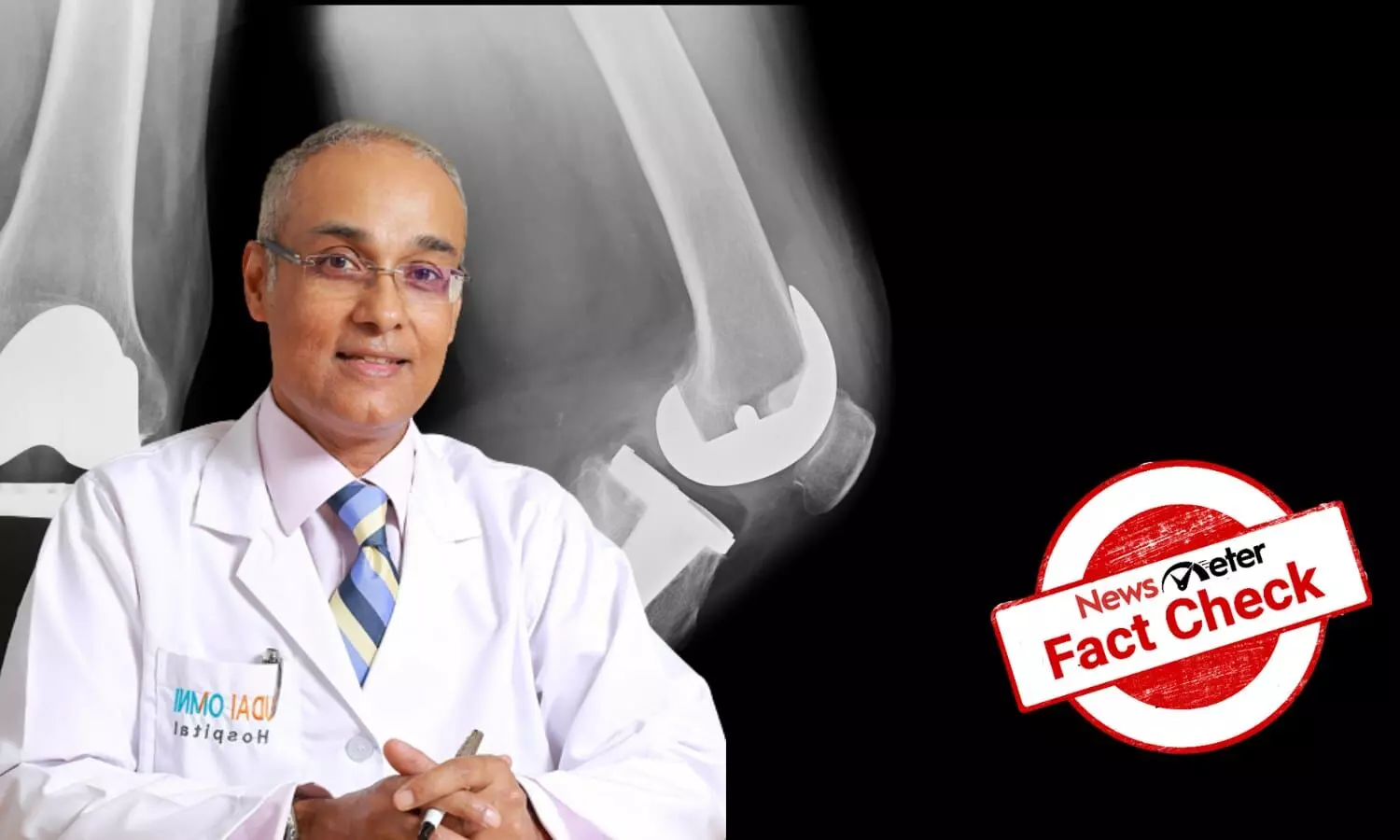Debunking myths about knee replacement surgery with Dr. Udai Prakash
Everything you need to know about knee replacement surgery.
By Sunanda Naik
Hyderabad: Dr. Udai Prakash, orthopaedic consultant, hip and knee specialist, Udai Omni Hospital, Hyderabad explains everything you need to know about knee replacement surgery.
Arthroplasty or knee replacement has become a must procedure for painful knees, popularised by surgeons and the media. However, it must be made clear to the public that it is the LAST option in the management of painful knee arthritis.
More than two lakh knee replacements are done in India each year, but the satisfaction rate after a knee replacement is not very high. Even in countries like the United Kingdom, nearly 20% of patients are dissatisfied with the outcome of this procedure.
What is a knee replacement?
The bottom end of the femur (thigh bone) and the top end of the tibia (shin bone) are capped with a metal implant and in between, a polyethylene spacer is inserted. This procedure corrects the deformity and restores movement and function of the knee.
How do I ensure a good result from knee replacement surgery?
Knee replacement should be done at the right hospital, at the right time, and by the right surgeon. Patients have to be prepared and motivated to endure a six-week recuperation period at home. Many patients may get surgeries done at a less advanced stage of arthritis and these people are generally unhappy with the final outcome. For good outcomes, pain control after surgery should include nerve blocks and multi-modal analgesia by a good pain control team. In addition, the patient should be reasonably healthy and strong as recovery does demand sustained dedication to physiotherapy and exercise.
Reasons you might need a knee replacement?
The most common reason for this operation is severe osteoarthritis, which causes relentless pain, joint deformity, and reduced mobility. Other reasons include rheumatoid arthritis, post-traumatic arthritis, etc. If you suffer from arthritis of the knee that remains painful despite treatment with medicines, physiotherapy, rest and support to assist your mobility, you may benefit from knee replacement surgery.
Your joint specialist may suggest a partial or total joint replacement knee surgery.
· Partial Knee Replacement: Here, only the diseased portion of the knee is replaced unlike in a total knee replacement where even the normal part of the knee is replaced. It goes without saying that a natural knee is always better than an artificial one. The healthy cartilage, bone and ligaments in the rest of the knee are preserved (left alone). There is less blood loss during surgery and knee function recovers faster with partial knee replacement. The knee feels more like a natural knee and functions like one too.
· Total Knee Replacement: This is also a highly successful procedure. Recovery takes longer when compared to a partial knee. At our hospital, total knee replacement is offered to those who have very advanced osteoarthritis involving most of the knee and to those who have inflammatory arthritis like Rheumatoid arthritis.
· Revision Knee Replacement: When a knee replacement fails, the old one must be removed and replaced with a new one. The results of revision surgery are good only in the hands of experienced surgeons. Most primary knee replacements are very successful. However, some 10% of them may fail over 20 years according to most joint registries. A knee replacement can wear out or fail for different reasons such as infection, instability, stiffness, wear and tear, loosening, and fractures around the prosthesis. Surgeons who do high volumes and those who have had good training have very low rates of failure.
Is a robot-assisted knee replacement better than a conventional one?
The much-hyped robotic knee replacement is much more expensive than a conventional one. To this day, there is no proof that they offer better outcomes or are any safer than conventionally done knee replacements. At our hospital, we prefer skilled surgeons rather than robots to do surgery. The day we are convinced that this is the way forward, we’ll get one!
What can you expect from a knee replacement?
Joint replacements are designed to relieve pain, stiffness and improve function. One cannot expect the artificial knee to function like that of a normal natural knee. Most patients are able to walk long distances and climb stairs comfortably. Many are able to live a relatively normal life. Those who’ve had partial knee replacements have a significantly better function in terms of strength and endurance than those who’ve had a conventional total knee replacement.